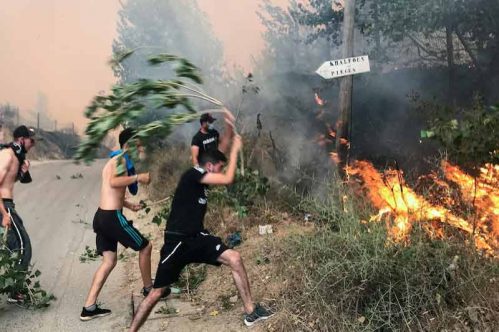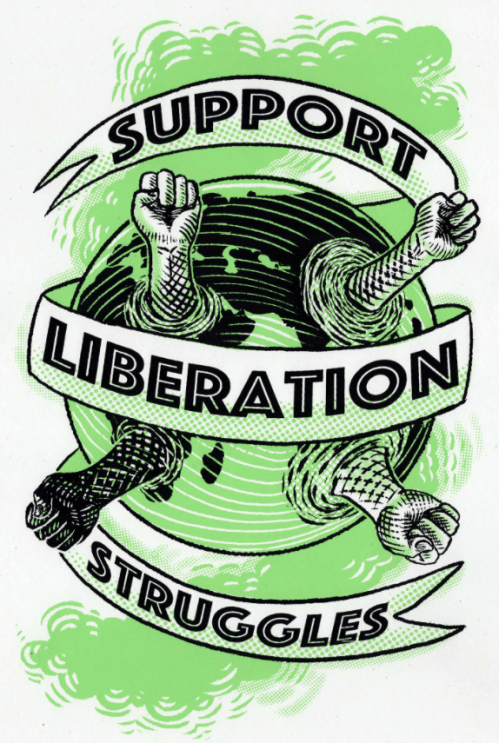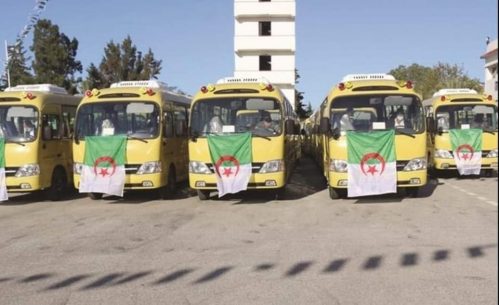Mira Moknache
Journey to the independence of Kabylie
The Raconte-Art (story-art) festival was held this year in one of the most beautiful and cleanest villages in Kabyle – “The village Sahel” of the chief place Bouzguen, in Kabylie.
At the heart of Kabylia, there is a deep Kabylia, that of ancient villages, places still virgin pure that have survived the many upheavals of Kabyles society through the ages, the conquests of different Turkish colonizers and the French march upon the land and settling of settlers. The post-1962 period was more ferocious, as the illegitimate and colonizing state installed several policies to eliminate and erase these villages, through policies of repression and economic and cultural marginalization through policy. There was an excess of Arabization, as well as policies of scorched land and corruption, policies aiming for the decay of society… Mouloud Feraoun said: The sustainability of Kabyle society through the ages seems to me to be explained mainly by two institutions; the village and traditions (in, days of Kabylie, Ed of the threshold, 1962).
The Kabyle villages have preserved the soul of Kabylie, that of the principles and values of TAQVAYLIT. In the village festival Sahel, there was a joy of life present on all the faces of the people who were there; women, men and children who circulated through the aisles to discover artistic productions and to contemplate this symbiosis with the traditional village. We were in a dream, where living together was possible, in a festive atmosphere, full of tolerance and life skills. Mixing had become natural – nobody thought about that, actually! Mixedness exists, beautiful and healthy in the Kabyle villages, in spite of the impressive number of people present. Respect and sharing allowed us to live together in peace and love.
Arriving at this village, you will find directions to the place of the prayers, the mosque and the church… What happiness! There is religious tolerance in the villages. In front of the mosque was the place of TAJMA3T, a place where people from the village meet to discuss village affairs. During the festival, the place of tajma3t was set up during daytime as a marketplace for books and a hub of conference, and at nighttime it was beholden to music. What happiness! To succeed in making religion, literary culture and musical culture coexist in the same place without violence or bloodshed… This is possible in Kabylia.
It is a crazy world. Thousands of people come in and go out every day, an impressive thing that challenges us, but there was no need for the presence of security services during the festival, no policemen or gendarmes. The people of the village who organized things. Just wearing a yellow badge or vest would make people listen to them and respect them. The adherence of all to the respect of the rules, which were in fact intrinsic to Kabyles, was done in a natural way. No need here for a stick! In Kabylia, there is another society apart from the world, one that carries another kind of organizational management of society.
Despite the impressive number of people, the village was able to organize affairs, from accommodation to catering, not to mention the rigid cleanliness! All the people of the village were mobilized (especially the women who played the thankless role of the little hands who did all the work in the shadows)! Beyond the manual work, technical, organizational etc., generosity too was needed. They had to provide funds to meet unforeseen needs of the festival, and they did so with a smile!
At night, there was a concert that saw several artists perform. An incredible world was up until 2am. At midnight, the singer Lahlou performed. The piblic was galvanized, in spite of and perhaps especially because of a power outage that was probably and above all a thing wanted in order to harm the festival. The audience, both women and men, were all singing songs about “Kabylie and Amazighness”. Both flags, Amazigh and Kabylie, soared among the audience; a deep sense of belonging to Kabylia was the present as a positive energy that floated and formed of all the auras a single people conscious of its existence and its will to exist as such: Kabyles who want to live their kabylité.
Through the one-day visit, one is transported to another world, a dream that one really lives. It is like a journey to the independence of Kabylie.
We witnessed in this village-state so much of what was told to us during the 19th century that we still believe that it is possible to regain this organization of the village, to create a village-state institution.
Today, July 26, leaving the festival and homeward bound, I learn that there is no transport line that leads to Akbou or Bejaia, even a stop was not possible. While inquiring about this absurd absentee transport, I explained that we are not far from the village of Ferhat Mehenni (commune Illoula, Daira Bouzeguen) and that in fact, the powers that be have marginalized the region. They have shown a total neglect, with no investment. Total desert is inevitable – houses only, no infrastructure, and the villages are left to their cruel fate. Yet in spite of this repression, because of the originality of a militant of the Kabylité, president of an independentist party, the inhabitants of the region resist, maintaining the fight for identity. Although there is no public transport, the placards on the roads are all inscribed in taqvaylit, not in classical Arabic or French Arabic.
As we travel, we return to the bitter and violent reality of the repression of Kabyle that we endure. We remained silent in front of all those lands of Kabylia that burn, fires set to destroy the Kabyle again, to destroy this rootedness to the land maintained by the Kabyles;
Kabylie and Kabyles have existed for centuries and millennia and will continue to exist, having faith that one day we will exude our kabylity entirely!
I thank my friends Mus Akkouche Amazigh Hamchache Hamchache Ryadh for sharing this journey to independence with debates until sunrise. I kiss you Hayet Medjebar and I thank you Malek Boudjemaa.
– with Mira Moknache.






Leave a Comment